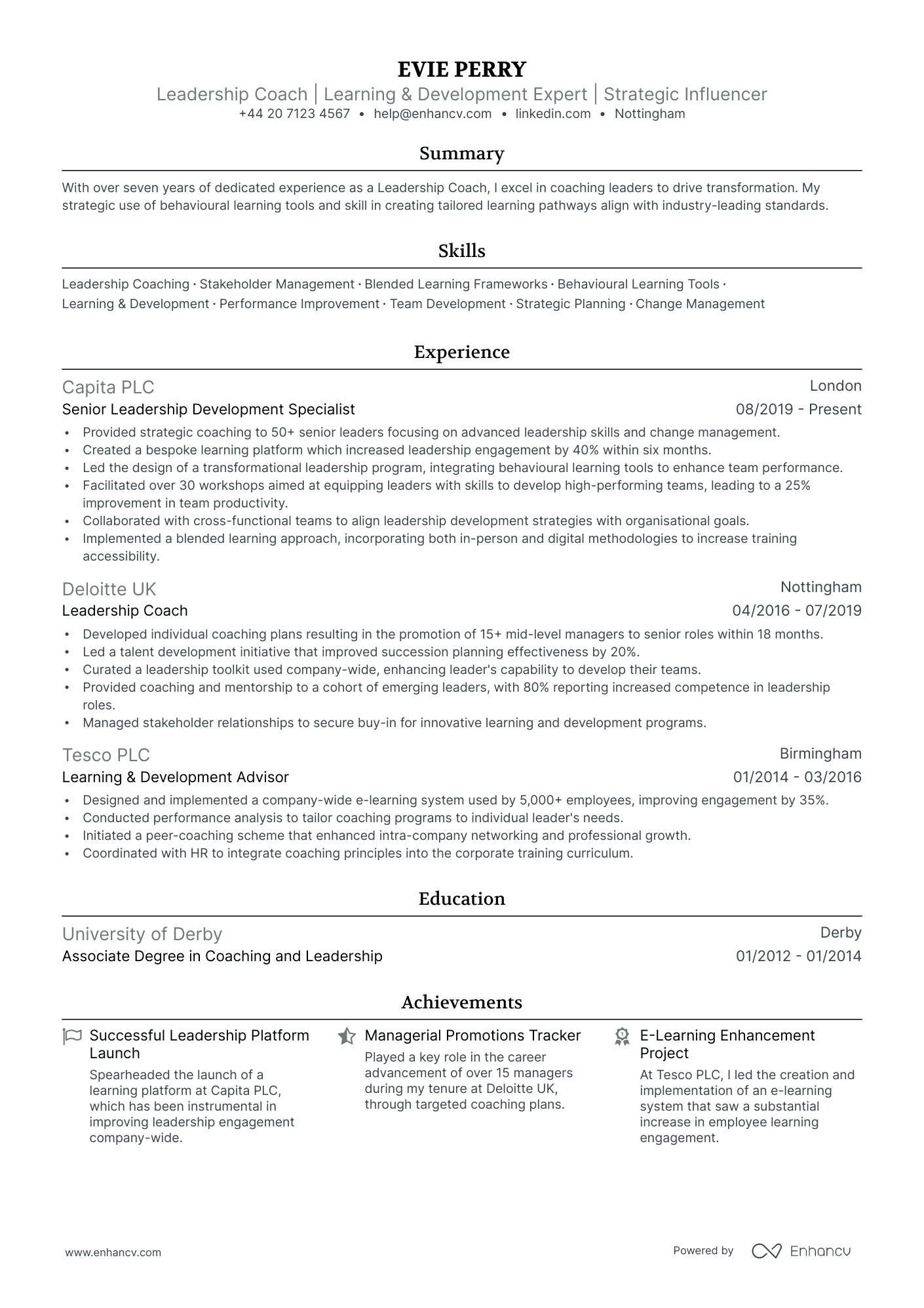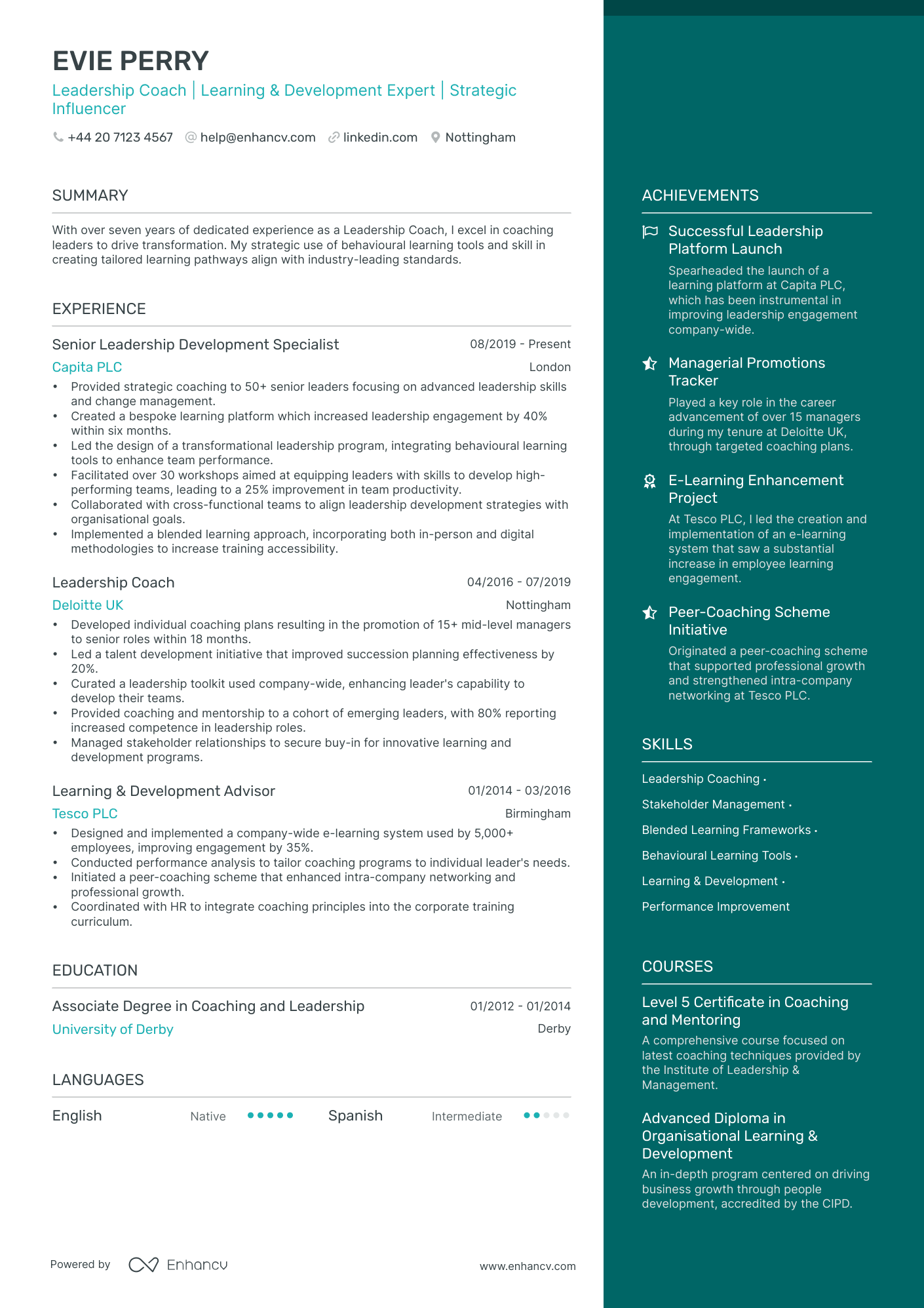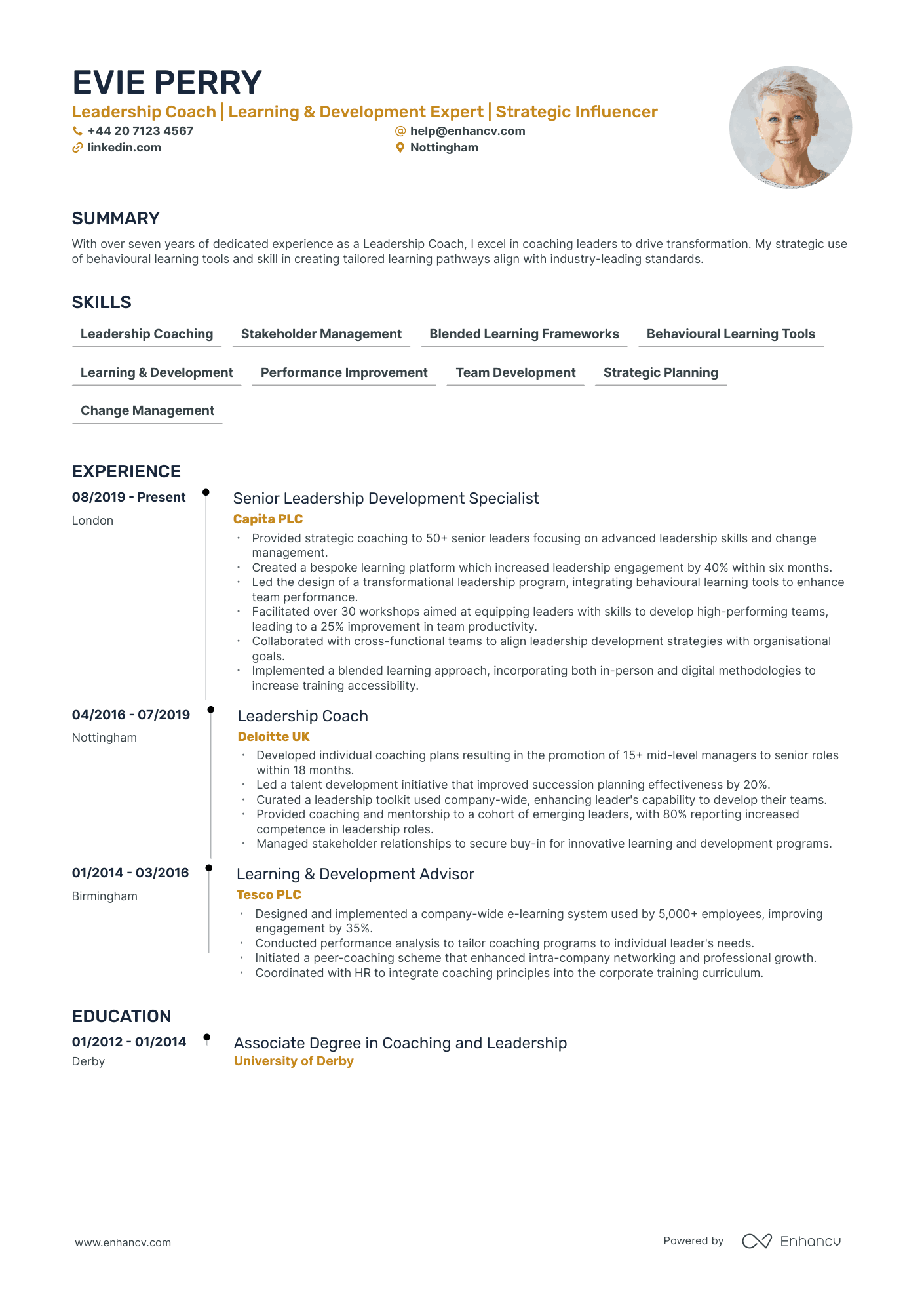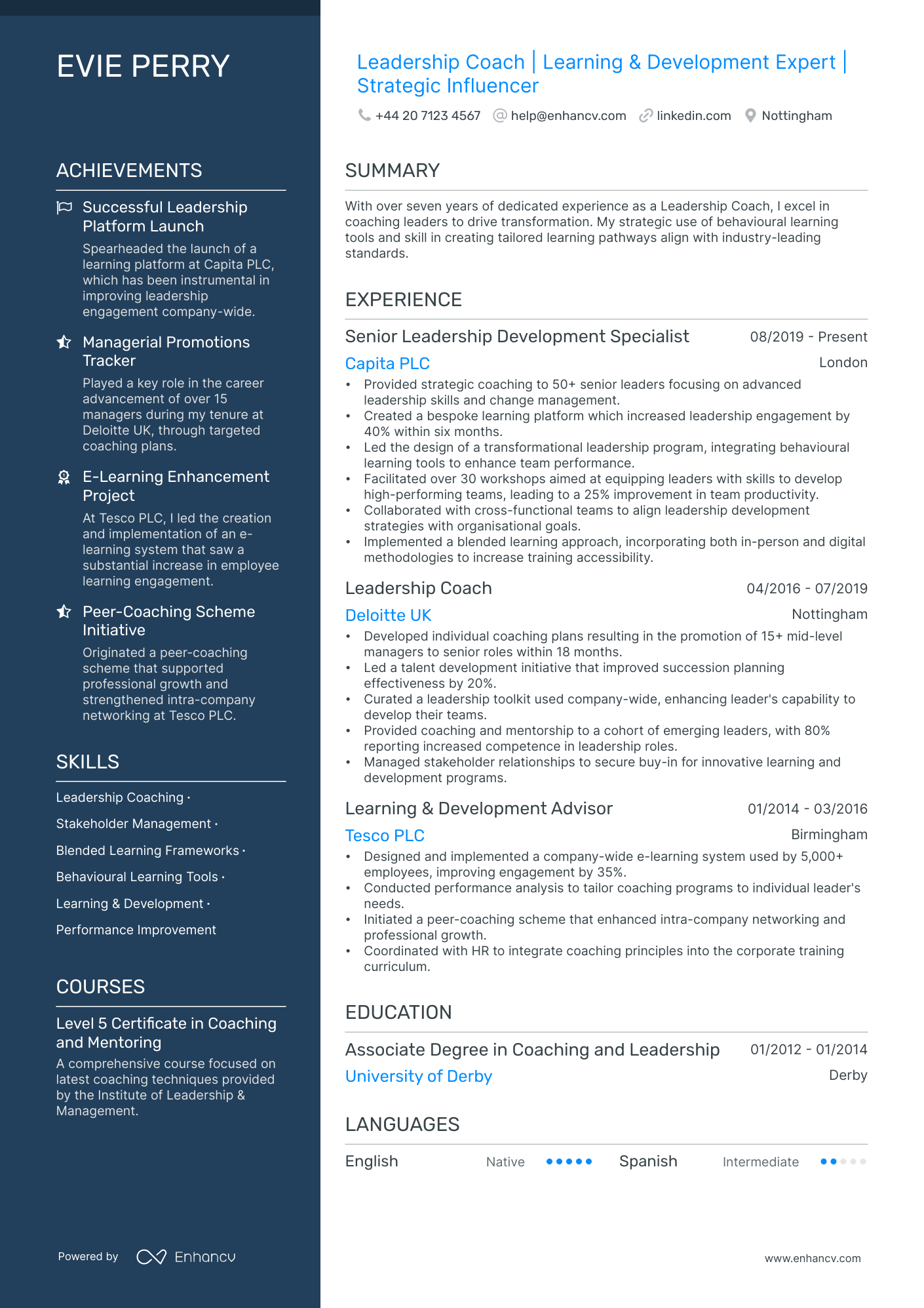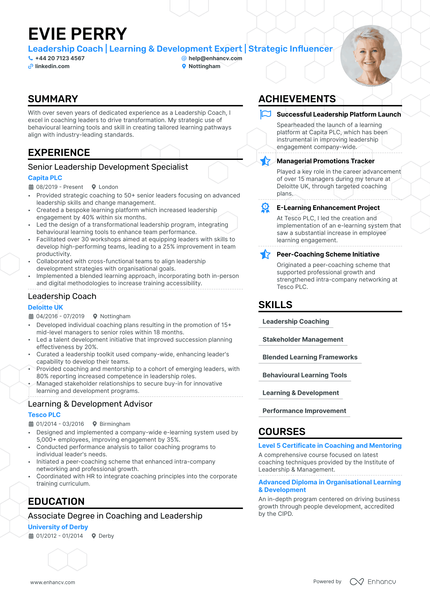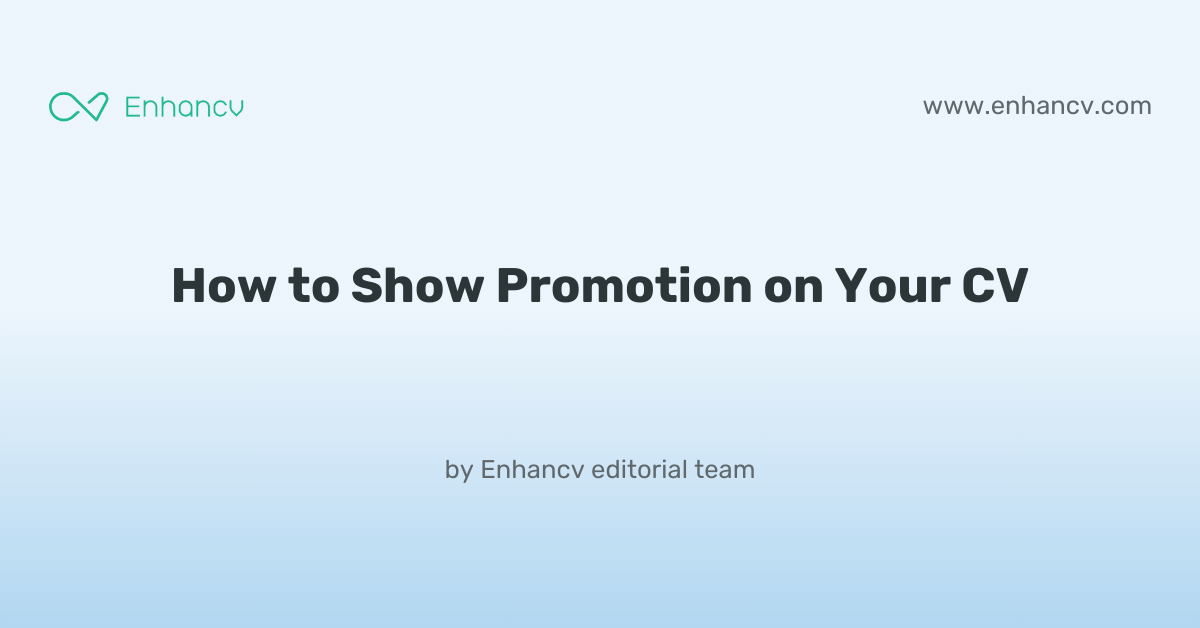One specific challenge you might encounter in your coaching journey is tailoring your CV to showcase the diverse skill set required in a coaching role. Our guide provides tailored advice and examples to help you effectively highlight your interpersonal abilities, experience, and coaching achievements to potential employers.
- Applying best practices from real-world examples to ensure your profile always meets recruiters' expectations;
- What to include in your work experience section, apart from your past roles and responsibilities?
- Why are both hard and soft skills important for your application?
- How do you need to format your CV to pass the Applicant Tracker Software (ATS) assessment?
If you're writing your CV for a niche coaching role, make sure to get some inspiration from professionals:
How to ensure your profile stands out with your coaching CV format
It's sort of a Catch 22. You want your coaching CV to stand out amongst a pile of candidate profiles, yet you don't want it to be too over the top that it's unreadable. Where is the perfect balance between your CV format simple, while using it to shift the focus to what matters most. That is - your expertise. When creating your coaching CV:- list your experience in the reverse chronological order - starting with your latest roles;
- include a header with your professional contact information and - optionally - your photograph;
- organise vital and relevant CV sections - e.g. your experience, skills, summary/ objective, education - closer to the top;
- use no more than two pages to illustrate your professional expertise;
- format your information using plenty of white space and standard (2.54 cm) margins, with colours to accent key information.
Once you've completed your information, export your coaching CV in PDF, as this format is more likely to stay intact when read by the Applicant Tracker System or the ATS. A few words of advice about the ATS - or the software used to assess your profile:
- Generic fonts, e.g. Arial and Times New Roman, are ATS-compliant, yet many candidates stick with these safe choices. Ensure your CV stands out by using a more modern, and simple, fonts like Lato, Exo 2, Volkhov;
- All serif and sans-serif fonts are ATS-friendly. Avoid the likes of fancy decorative or script typography, as this may render your information to be illegible;
- Both single- and double-column formatted CVs could be assessed by the ATS;
- Integrating simple infographics, icons, and charts across your CV won't hurt your chances during the ATS assessment.
PRO TIP
Be mindful of white space; too much can make the CV look sparse, too little can make it look cluttered. Strive for a balance that makes the document easy on the eyes.
The top sections on a coaching CV
- Coaching Philosophy highlights your approach and values, critical for alignment with the team's ethos.
- Professional Experience shows your track record and expertise in coaching roles.
- Coaching Achievements demonstrate the impact you've had and successes in your career.
- Education and Certifications provide proof of your formal qualifications and specialised training.
- Testimonials or References offer credibility through endorsements from credible sources within the sport.
What recruiters value on your CV:
- Highlight your coaching philosophy and approach, detailing specific methodologies or frameworks you employ to develop and improve individuals or teams in your past coaching roles.
- Emphasise your communication skills, demonstrating your ability to motivate, provide feedback, and effectively interact with a diverse array of personalities and learning styles.
- Detail your expertise in the area of coaching you specialise in, whether it's sports, executive, life, or another niche, showcasing your experience, certifications, and any relevant results achieved.
- Outline your ability to set goals, plan strategically, and track progress, providing examples of how your planning has led to measurable success in your coaching engagements.
- Include testimonials or references from previous coachees or employers that can attest to your effectiveness, leadership, and impact as a coach.
Recommended reads:
Making a good first impression with your coaching CV header
Your typical CV header consists of Your typical CV header consists of contact details and a headline. Make sure to list your professional phone number, email address, and a link to your professional portfolio (or, alternatively, your LinkedIn profile). When writing your CV headline , ensure it's:
- tailored to the job you're applying for;
- highlights your unique value as a professional;
- concise, yet matches relevant job ad keywords.
You can, for examples, list your current job title or a particular skill as part of your headline. Now, if you decide on including your photo in your CV header, ensure it's a professional one, rather than one from your graduation or night out. You may happen to have plenty more questions on how to make best the use of your CV headline. We'll help you with some real-world examples, below.
Examples of good CV headlines for coaching:
- Executive Coach | Leadership Development Expert | ICF Certified | 12 Years' Experience
- Career Transition Specialist | Accredited Coach | Mentorship & Personal Branding | 8+ Years in Industry
- Health & Wellness Coach | Mindfulness Practitioner | Nutrition Guidance | 5 Years Professional Coaching
- Performance Coach | High-Impact Strategies | Sports Psychology | UEFA Pro Licence | 15 Years Coaching
- Business Coach | SME Growth Strategist | Start-Up Advisor | CMI Level 7 | 10 Years Expertise
- Life Coach | NLP Master Practitioner | Work-Life Balance Advocate | 7 Years Transforming Lives
Your coaching CV introduction: selecting between a summary and an objective
coaching candidates often wonder how to start writing their resumes. More specifically, how exactly can they use their opening statements to build a connection with recruiters, showcase their relevant skills, and spotlight job alignment. A tricky situation, we know. When crafting you coaching CV select between:
- A summary - to show an overview of your career so far, including your most significant achievements.
- An objective - to show a conscise overview of your career dreams and aspirations.
Find out more examples and ultimately, decide which type of opening statement will fit your profile in the next section of our guide:
CV summaries for a coaching job:
- With over a decade of proven excellence in sports coaching, this seasoned professional has led multiple teams to league championships. Adept in creating tailored training programmes, harnessing cutting-edge sports science techniques, and fostering team cohesion, their crowning achievement includes a transformative role in taking a junior team to national victory.
- Esteemed executive coach with 15 years of experience in developing impactful leaders within the financial sector. Employs a unique blend of psychological insight and business acumen, has a track record of successfully facilitating C-suite executive transitions, and was instrumental in restructuring a Fortune 500 company's leadership training process.
- A former marketing director with an extensive 20-year career, this strategic thinker is pivoting to leadership coaching, bringing a wealth of experience in team management, brand strategy, and thought leadership. Their most significant accomplishment was spearheading an international campaign that resulted in a market share increase of 25%.
- Transitioning from a 15-year tenure in high-stakes IT project management to executive coaching, this expert possesses critical insights into the tech industry. Skilled in agile methodologies and complex problem-solving, they have facilitated successful turnarounds of underperforming departments, evidenced by a 40% increase in productivity under their guidance.
- Eager to embark on a coaching career, this individual is armed with a passionate commitment to personal development and a recent, comprehensive certification in life coaching. They aspire to leverage their robust interpersonal skills and enthusiasm for helping others achieve their fullest potential in a dynamic coaching environment.
- As a fresh graduate with a degree in Psychology and a newfound dedication to coaching, this aspirant aims to integrate theoretical knowledge with practical application in a real-world setting. Keen on contributing to the positive growth of individuals, they seek to cultivate a successful track record of client progress and satisfaction.
The best formula for your coaching CV experience section
The CV experience section is the space where many candidates go wrong by merely listing their work history and duties. Don't do that. Instead, use the job description to better understand what matters most for the role and integrate these keywords across your CV. Thus, you should focus on:
- showcasing your accomplishments to hint that you're results-oriented;
- highlighting your skill set by integrating job keywords, technologies, and transferrable skills in your experience bullets;
- listing your roles in reverse chronological order, starting with the latest and most senior, to hint at how you have grown your career;
- featuring metrics, in the form of percentage, numbers, etc. to make your success more tangible.
When writing each experience bullet, start with a strong, actionable verb, then follow it up with a skill, accomplishment, or metric. Use these professional examples to perfect your CV experience section:
Best practices for your CV's work experience section
- Detail your coaching philosophy, emphasising how it promotes growth and development among your coachees, making sure it aligns with the prospective organisation's values.
- Highlight specific coaching techniques and tools you are proficient with, such as GROW, CLEAR, and OSCAR models, and provide instances where they facilitated effective coaching sessions.
- Include measurable achievements such as improved performance metrics or attainment of specific goals by your coachees, underlining the impact of your coaching.
- Feature any specialised areas of expertise, such as executive coaching or career transition coaching, and cite examples of your successes in these niches.
- Outline your ability to establish and maintain trusting relationships with diverse coachees, demonstrating cultural sensitivity and strong interpersonal skills.
- Document your continuous professional development in coaching, including attendance at seminars, certifications obtained, or relevant training completed.
- Address your experience in implementing coaching programmes within organisations, and how these initiatives have benefited the company culture and bottom line.
- Recount specific feedback received from coachees and peers, using testimonials that showcase your ability to positively influence and guide others.
- List any professional affiliations, such as membership in coaching organisations like the International Coaching Federation (ICF), to establish credibility and commitment to coaching standards.
- Devised comprehensive coaching programmes which improved players' performance by 30% as measured by key performance indicators.
- Managed a team of assistant coaches and coordinated training schedules for the Under-18 division, increasing team cohesion and on-field efficiency.
- Implemented and refined advanced video analysis techniques that enabled detailed player assessments and individual feedback sessions.
- Spearheaded the development of a youth basketball program, which expanded to include over 200 participants within a two-year period.
- Cultivated talent through individualised coaching plans, leading to three athletes receiving collegiate scholarships.
- Organised regional tournaments and fostered relationships with sponsors, raising the academy's profile and securing £20,000 in funding.
- Designed and implemented a cutting-edge, data-driven coaching strategy that increased team batting averages by 15%.
- Provided mentorship to a roster of 25 players, with five going on to be drafted by professional cricket teams.
- Negotiated equipment endorsements valued at £50,000, enhancing the training resources and facilities available to the team.
- Orchestrated the turnaround of the women's rugby team from a losing record to regional champions within two seasons.
- Implemented a comprehensive nutrition and fitness program that decreased team injuries by 40%.
- Collaborated with local schools to establish a grassroots outreach program, ultimately tripling the team's fan base.
- Enhanced the technical skills of individual players through personalised training sessions, contributing to the team securing the national championship title.
- Led the development of a digital playbook app, which was adopted by 500+ team members and improved play execution by 25%.
- Boosted player motivation by establishing a continuous performance appraisal system and aligning incentives with team objectives.
- Oversaw a significant uplift in team performance metrics, with a 20% improvement in win rate over 4 seasons.
- Attracted top-tier talent by initiating a university scouting program, securing four All-Conference players for the team within three years.
- Developed a sponsor relations program that led to a 150% increase in annual sponsorship revenue.
- Facilitated high-impact training camps that enhanced team's endurance and technical abilities, resulting in a 50% reduction in second-half score concessions.
- Established a player mentoring initiative that improved young players' integration into the senior team, decreasing transition time by six months.
- Organised international coaching workshops, enhancing coaching methodologies across the club and attracting global coaching talent.
- Pioneered an innovative e-sports coaching curriculum that resulted in the team winning three consecutive national championships.
- Conducted detailed performance analytics to tailor strategies to opponents, which improved match win rates by 35%.
- Cultivated a culture of continuous improvement, with players regularly engaged in self-review and peer feedback sessions.
Lacking professional expertise: how to write your CV to highlight your best talents
Don't count on your lucky stars when you're applying for a role, where you happen to have less (or almost none) professional experience. Recruiters sometimes do hire inexperienced candidates if they're able to present their unique value from the get-go. So, instead of opting for the traditional, CV experience section:
- List any applicable expertise you happen to have - no matter if it's a part-time job, internship, or volunteer work. This would hint to recruiters that your profile is relevant;
- Focus your CV on your transferrable skills or talents you've obtained thanks to your whole life and work experience. In effect, you'll be spotlighting your value as a candidate;
- Separate more space for your applicable academic background and certificates to show you have the technical know-how;
- Ensure that within your objective, you've defined why you'll like the job and how you'll be the perfect match for it. Always ensure you've tailored your CV to individual applications.
Looking for more good examples for your first job? We'll show you how other candidates, with less professional experience, have created their job-winning CVs.
Recommended reads:
PRO TIP
Talk about any positive changes you helped bring about in your previous jobs, like improving a process or helping increase efficiency.
Describing your unique skill set using both hard skills and soft skills
Your coaching CV provides you with the perfect opportunity to spotlight your talents, and at the same time - to pass any form of assessment. Focusing on your skill set across different CV sections is the way to go, as this would provide you with an opportunity to quantify your achievements and successes. There's one common, very simple mistake, which candidates tend to make at this stage. Short on time, they tend to hurry and mess up the spelling of some of the key technologies, skills, and keywords. Copy and paste the particular skill directly from the job requirement to your CV to pass the Applicant Tracker System (ATS) assessment. Now, your CV skills are divided into:
- Technical or hard skills, describing your comfort level with technologies (software and hardware). List your aptitude by curating your certifications, on the work success in the experience section, and technical projects. Use the dedicated skills section to provide recruiters with up to twelve technologies, that match the job requirements, and you're capable of using.
- People or soft skills provide you with an excellent background to communicate, work within a team, solve problems. Don't just copy-paste that you're a "leader" or excel at "analysis". Instead, provide tangible metrics that define your success inusing the particular skill within the strengths, achievements, summary/ objective sections.
Top skills for your coaching CV:
Goal Setting
Strategic Planning
Performance Analysis
Mentoring Techniques
Skill Development
Data Analysis
Psychological Assessment
Programme Development
Sports Science Knowledge
Nutritional Planning
Leadership
Communication
Empathy
Active Listening
Adaptability
Team Building
Motivation
Problem-Solving
Time Management
Conflict Resolution
PRO TIP
Focus on describing skills in the context of the outcomes they’ve helped you achieve, linking them directly to tangible results or successes in your career.
Your university degree and certificates: an integral part of your coaching CV
Let's take you back to your uni days and decide what information will be relevant for your coaching CV. Once more, when discussing your higher education, select only information that is pertinent to the job (e.g. degrees and projects in the same industry, etc.). Ultimately, you should:
- List only your higher education degrees, alongside start and graduation dates, and the university name;
- Include that you obtained a first degree for diplomas that are relevant to the role, and you believe will impress recruiters;
- Showcase relevant coursework, projects, or publications, if you happen to have less experience or will need to fill in gaps in your professional history.
PRO TIP
Order your skills based on the relevance to the role you're applying for, ensuring the most pertinent skills catch the employer's attention first.
Recommended reads:
Key takeaways
Write your professional coaching CV by studying and understanding what the role expectations are. You should next:
- Focus on tailoring your content to answer specific requirements by integrating advert keywords through various CV sections;
- Balance your technical know-how with your personal skills to showcase what the unique value would be of working with you;
- Ensure your CV grammar and spelling (especially of your key information and contact details) is correct;
- Write a CV summary, if your experience is relevant, and an objective, if your career ambitions are more impressive;
- Use active language by including strong, action verbs across your experience, summary/objective, achievements sections.
